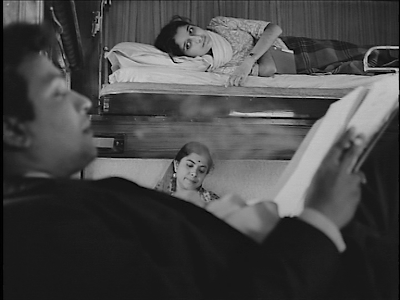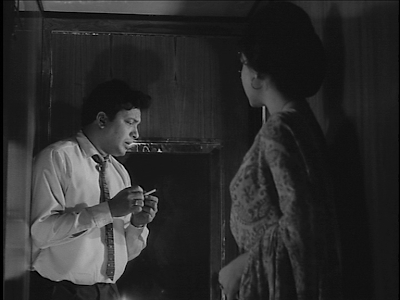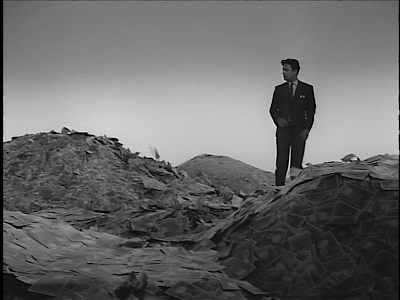 Nayak : The Hero
Nayak : The HeroA Film by Satyajit Ray
Year: 1969
Runtime ; 120 mins
Bengali with English subtitles
20th Nov 2011; 5.45 pm
Perks Mini Theater
 Satyajit Ray’s Nayak : The Hero explores the Bengali film industry primarily through a successful but self-doubting movie star idol. Through the star’s mid-life crisis and self-examination, we also glimpse the challenges that face Bollywood itself: its lightweight escapist fare, commercial emphasis, and corrupt business practices. Nayak: the Hero, a lesser-known work of Ray, was a 1966 Berlin Film Festival winner.
Satyajit Ray’s Nayak : The Hero explores the Bengali film industry primarily through a successful but self-doubting movie star idol. Through the star’s mid-life crisis and self-examination, we also glimpse the challenges that face Bollywood itself: its lightweight escapist fare, commercial emphasis, and corrupt business practices. Nayak: the Hero, a lesser-known work of Ray, was a 1966 Berlin Film Festival winner. The hero in question is Arindam Mukherjee, one of India's most popular film stars and so named for the roles he plays, and he's about to undergo a journey both physical and emotional. As the film opens he's preparing to depart for Delhi to collect a prestigious award, a journey he elects to do by train when all available flights are booked.
The hero in question is Arindam Mukherjee, one of India's most popular film stars and so named for the roles he plays, and he's about to undergo a journey both physical and emotional. As the film opens he's preparing to depart for Delhi to collect a prestigious award, a journey he elects to do by train when all available flights are booked. Once the journey gets under way, the story focus widens to include a collection of characters worthy of an Agatha Christie mystery, strangers on a train destined to interact in ways that could prove quietly life-changing for each other. Ray spends a good half-hour just sketching this characters and allowing them to energetically interact and frankly could have spent longer, so engaging are they and their exchanges.
Once the journey gets under way, the story focus widens to include a collection of characters worthy of an Agatha Christie mystery, strangers on a train destined to interact in ways that could prove quietly life-changing for each other. Ray spends a good half-hour just sketching this characters and allowing them to energetically interact and frankly could have spent longer, so engaging are they and their exchanges. The various reactions to Arindam's presence are of particular interest, from the feverish Bulbul's unbroken gaze to her father's disapproving bluster, dismissing the Indian film industry with the proclamation that "Our motto seems to be produce more and produce rubbish,"
The various reactions to Arindam's presence are of particular interest, from the feverish Bulbul's unbroken gaze to her father's disapproving bluster, dismissing the Indian film industry with the proclamation that "Our motto seems to be produce more and produce rubbish," Arindam (played with relish by real-life Bengali romantic lead Uttam Kumar) famously lives an indulgent life of adulation-his every move chronicled by the tabloid press. He is currently the subject of notable gossip for a drunken barroom assault. The only passenger that intrigues him is strangely indifferent to his stardom, who rarely watches any of his movies since she finds them trite and hopelessly unrealistic is Aditi (Sharmila Tagore), a journalist who seeks an interview for her obscure independent magazine.
Arindam (played with relish by real-life Bengali romantic lead Uttam Kumar) famously lives an indulgent life of adulation-his every move chronicled by the tabloid press. He is currently the subject of notable gossip for a drunken barroom assault. The only passenger that intrigues him is strangely indifferent to his stardom, who rarely watches any of his movies since she finds them trite and hopelessly unrealistic is Aditi (Sharmila Tagore), a journalist who seeks an interview for her obscure independent magazine. The train journey is used by the director to explore other aspects of Bengali society in microcosm. By building the larger part of the film around Arindam’s memories of his rise to fame and his nightmares of losing it all, it does tread a familiar path of the trappings of fame and celebrity to the cost of the wider social aspects of the story. At the same time however, it allows Ray to retain a realistic human touch, the director finding a perfect expression for the hitting home of reality for each of the characters at the end of their journey, even if it doesn’t essentially change them.
The train journey is used by the director to explore other aspects of Bengali society in microcosm. By building the larger part of the film around Arindam’s memories of his rise to fame and his nightmares of losing it all, it does tread a familiar path of the trappings of fame and celebrity to the cost of the wider social aspects of the story. At the same time however, it allows Ray to retain a realistic human touch, the director finding a perfect expression for the hitting home of reality for each of the characters at the end of their journey, even if it doesn’t essentially change them.Satyajit Ray was born in Calcutta into an exceptionally talented family who were prominent in Bengali arts and letters. His father died when he was an infant and his mother and her younger brother's family brought him up. After graduating from Presidency College, Calcutta, in 1940, he studied art at Rabindranath Tagore's University in Shantiniketan, West Bengal. He took up commercial advertising and he also designed covers and illustrated books brought out by Signet Press. One of these books was an edition of Bibhutibhushan Bandyopadhya's novel, Pather Panchali, which was to become his first film. In 1947 Ray established the Calcutta Film Society. During a six month trip to Europe in 1950, he managed to see 100 films, including Vittorio De Sica's Ladri di Biciclette (1948), which greatly inspired him. He returned convinced that it was possible to make realist cinema and with an amateur crew he endeavoured to prove this to the world.
In 1955, after incredible financial hardship (shooting on the film stopped for over a year) his adaptation of Pather Panchali (Song of the Little Road) was completed. Prior to the 1956 Cannes Festival, Indian Cinema was relatively unknown in the West, just as Japanese cinema had been prior to Kurosawa's Rashomon (1950). However, with Pather Panchali, Satyajit Ray suddenly assumed great importance. The film went on to win numerous awards abroad including Best Human Document at Cannes. Pather Panchali's success launched an extraordinary international film career for Ray.
A prolific filmmaker, during his lifetime Ray directed 36 films, comprising of features, documentaries and short stories. These include the renowned Apu trilogy (Pather Panchali, Aparajito [1956] and Apur Sansar [1959]), Jalsaghar (1958), Postmaster (1961), Charulata (1964), Days and Nights in the Forest (1969) and Pikoo (1980) along with a host of his lesser known works which themselves stand up as fine examples of story telling. His films encompass a diversity of moods, techniques, and genres: comedy, satire, fantasy and tragedy. Usually he made films in a realist mode, but he also experimented with surrealism and fantasy.
(From - Senses Of Cinema)
In 1955, after incredible financial hardship (shooting on the film stopped for over a year) his adaptation of Pather Panchali (Song of the Little Road) was completed. Prior to the 1956 Cannes Festival, Indian Cinema was relatively unknown in the West, just as Japanese cinema had been prior to Kurosawa's Rashomon (1950). However, with Pather Panchali, Satyajit Ray suddenly assumed great importance. The film went on to win numerous awards abroad including Best Human Document at Cannes. Pather Panchali's success launched an extraordinary international film career for Ray.
A prolific filmmaker, during his lifetime Ray directed 36 films, comprising of features, documentaries and short stories. These include the renowned Apu trilogy (Pather Panchali, Aparajito [1956] and Apur Sansar [1959]), Jalsaghar (1958), Postmaster (1961), Charulata (1964), Days and Nights in the Forest (1969) and Pikoo (1980) along with a host of his lesser known works which themselves stand up as fine examples of story telling. His films encompass a diversity of moods, techniques, and genres: comedy, satire, fantasy and tragedy. Usually he made films in a realist mode, but he also experimented with surrealism and fantasy.
(From - Senses Of Cinema)



